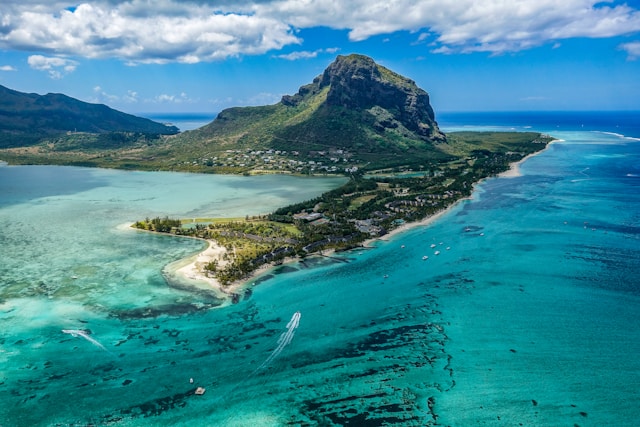
Key Facts to Hire in Mauritius
Port-Louis
Capital
Mauritian Rupee (MUR)
Currency
No official language, but English and French are widely used
National language
1,266,030
Total population
7.10%
GDP growth
0.02%
Total country’s GDP world share
Monthly
Payroll frequency
45 hours per week
Total working hours
Overview in Mauritius
Mauritius, a small island nation in the Indian Ocean, has transformed from a colonial sugar-producing outpost to a thriving, diversified economy. Discovered by Portuguese explorers in the 16th century, it was subsequently colonized by the Dutch, French, and British, each leaving lasting cultural imprints. This rich colonial history has shaped Mauritius into a vibrant multicultural society, blending Indian, African, Chinese, and European influences. Since gaining independence in 1968, Mauritius has achieved remarkable economic success, transitioning from a sugar-dependent economy to one driven by tourism, financial services, and manufacturing.
The country’s strategic location, political stability, and business-friendly policies have attracted significant foreign investment, contributing to its reputation as an “African Tiger.” Despite its small size and limited natural resources, Mauritius has consistently outperformed many of its continental peers in terms of economic growth and social development. The workforce is diverse, comprising locals and a significant number of expatriates and foreign workers, particularly in the tourism and financial sectors. Mauritius faces challenges typical of small island developing states, including vulnerability to external economic shocks and climate change. The workplace culture in Mauritius blends Western business practices with local traditions, emphasizing relationship-building and respect for hierarchy. This unique combination of factors has positioned Mauritius as an attractive destination for international businesses looking to establish a presence in Africa or the Indian Ocean region.
Employer of Record in Mauritius
Hightekers is a global Employer of Record service that helps you hire employees in Mauritius without the hassle of setting up a local entity. We handle all the legal and compliance matters as the official employer for your Mauritius team, allowing you to concentrate on growing your business.
How does it work?
When you hire employees in Mauritius through Hightekers, we take on the role of the legal employer for your staff. This allows us to manage all employer responsibilities while you continue to oversee the daily operations and management of your employees.
As the company, you oversee direct relationships with employees, assigning tasks and managing their performance. Hightekers handles local payroll, contracts, HR, benefits, and compliance matters.

Responsibilities of an Employer of Record
As an Employer of Record in Mauritius, Hightekers is responsible for creating and managing employment contracts, running monthly payroll, providing local and global benefits, ensuring 100% local compliance, and offering local HR support. We handle all legal and administrative aspects of employment, allowing you to focus on your core business activities.

Responsibilities of the company that hires the employee
As the company that hires the employee through the Employer of Record, you are responsible for the day-to-day management of the employee, including work assignments, performance management, and training and development. This arrangement allows you to maintain direct control over your team’s productivity and growth while we handle the complexities of local employment regulations.

Taxes in Mauritius
In Mauritius, the tax system is designed to be competitive and attractive for both local and foreign investors. The country operates on a residence-based taxation system with a flat income tax rate of 15% for both individuals and corporations. This simplified tax structure applies to all sources of income, including employment, business, and investment income.
For employees, income tax is typically withheld by employers through a Pay As You Earn (PAYE) system. Employers are required to deduct and remit these taxes monthly. Self-employed individuals and businesses file annual tax returns.
Social security contributions in Mauritius are managed through the National Pension Fund (NPF) and National Savings Fund (NSF). Employers contribute 6% of an employee’s basic salary to the NPF, while employees contribute 3%. Additionally, employers contribute 2.5% to the NSF.
Value Added Tax (VAT) in Mauritius is currently set at 15%. However, certain essential goods and services are zero-rated or exempt. Businesses with an annual turnover exceeding MUR 6 million must register for VAT.
Mauritius offers various tax incentives to attract investment, including an eight-year tax holiday for specific sectors such as Freeport operations, innovation-driven activities, and global headquarters administration. The country also has a network of double taxation agreements to prevent double taxation on foreign income.
Other taxes include customs duties on imported goods, land transfer tax, and a solidarity levy on high-income earners. Mauritius does not impose capital gains tax or inheritance tax, further enhancing its appeal as a tax-friendly jurisdiction.

Hire locally in Mauritius by partnering with Hightekers
Leave in Mauritius
Leave patterns in Mauritius, like in many countries, are shaped by cultural, legal, and economic factors. Here’s an overview of common leave types in Mauritius:
Annual Leave: 20 working days per year, allowing employees time for rest and personal activities.
Sick Leave: 15 days per year, supporting employee health and recovery.
Public Holidays: 14 paid public holidays annually, celebrating national and religious occasions.
Maternity Leave: 14 weeks with full pay, protecting maternal health and promoting child bonding.
Paternity Leave: 5 continuous working days, encouraging father-child bonding.
Bereavement Leave: 3 days for immediate family members, providing time for grieving and funeral arrangements.
Special Leave: Up to 6 days per year for exams, civil or public duties, or other special circumstances.
Injury Leave: Up to 2 years for work-related injuries, ensuring employee welfare and recovery.
Vacation Leave: Typically combined with annual leave, allowing extended time off for travel or relaxation.
Compensatory Leave: Time off in lieu of overtime work, maintaining work-life balance.
Hajj Leave: Up to 30 days once in a lifetime for Muslim employees, supporting religious obligations.
While these leave types are common in Mauritius, it’s important to note that specific policies may vary between employers and sectors within the country. Mauritius continually reviews and updates its leave policies to ensure a balance between employee welfare and economic productivity.
Benefits in Mauritius
Mauritius offers a comprehensive benefits package to its employees, heavily influenced by its robust social security system. Employers and employees contribute to this system, which provides essential benefits such as pensions, unemployment insurance, healthcare, and workplace injury coverage.
Core Benefits:
- Healthcare: Employers often supplement the mandatory social security healthcare coverage with private health insurance plans to provide broader coverage and reduce out-of-pocket costs.
- Pensions: Mauritius has a two-pillar pension system, consisting of state pensions and employer-sponsored pension plans.
- Paid Time Off: Employees in Mauritius enjoy generous paid time off allowances, including annual leave, public holidays, and paid sick leave.
- Parental Leave: Both parents in Mauritius are entitled to substantial paid leave for newborns, ensuring that they can take time to care for their children.
Disability Insurance: The Mauritian social security system provides disability insurance that covers income loss due to work-related or non-work-related disabilities.
Additional Benefits:
- Meal Vouchers: Many Mauritian companies offer meal vouchers to employees, which can be used to offset food costs.
- Company Cars or Mobility Budgets: Company cars or mobility budgets are popular perks in Mauritius, providing employees with transportation options.
- Flexible Working: Flexible working arrangements, such as remote work or flexible hours, are becoming increasingly prevalent in Mauritian workplaces.
Note: The specific benefits offered may vary depending on the company’s size, industry, and collective bargaining agreements. While the social security system provides a strong foundation, additional benefits can enhance employee satisfaction and attract top talent.
Workers Rights in Mauritius
In Mauritius, worker rights are primarily governed by the Employment Rights Act 2008 and the Workers’ Rights Act 2019. These laws provide comprehensive protection for employees, covering aspects such as employment termination, anti-discrimination measures, and work hours. The standard work week is 45 hours, with provisions for overtime pay. Mauritius has a national minimum wage system, regularly adjusted to reflect economic conditions. Leave entitlements are generous, including annual leave, sick leave, and maternity leave. The Occupational Safety and Health Act 2005 ensures workplace safety standards.
The National Pensions Act provides for social security benefits, including retirement pensions and disability benefits. Dispute resolution mechanisms include the Commission for Conciliation and Mediation and the Employment Relations Tribunal. Workers have the right to form and join trade unions, with collective bargaining protected under the Employment Relations Act 2008. Special provisions exist for specific sectors, such as the Export Processing Zone. The country’s multicultural society influences workplace practices, with efforts to promote diversity and inclusion.
Recent reforms have focused on enhancing work-life balance and protecting vulnerable workers. The Workers’ Rights Act 2019 introduced new provisions on job security and flexible work arrangements. Mauritius continues to adapt its labour laws to balance worker protection with economic competitiveness. The country’s strong social dialogue tradition contributes to ongoing improvements in worker rights. Cultural considerations, such as religious observances, are generally respected in the workplace, reflecting Mauritius’s diverse population.
Agreements in Mauritius
In Mauritius, employment agreements are primarily governed by the Workers’ Rights Act 2019 and the Employment Rights Act 2008. These laws recognize several types of employment contracts, including indefinite-term contracts, fixed-term contracts, and part-time contracts. The most common is the indefinite-term contract, which provides long-term job security. Fixed-term contracts are used for specific projects or temporary replacements, while part-time contracts are subject to specific regulations regarding working hours and benefits.
Key terms and conditions in Mauritian employment contracts typically include job description, working hours, remuneration, leave entitlements, and notice periods. The standard work week is 45 hours, with provisions for overtime pay. Contracts must comply with the national minimum wage, which is sector-specific. Legal compliance is crucial, with contracts required to adhere to both Mauritian labor laws and relevant international labor standards. Dispute resolution mechanisms often involve internal procedures, followed by mediation through the Commission for Conciliation and Mediation, or formal proceedings at the Employment Relations Tribunal. Confidentiality clauses are common in Mauritian contracts, but non-compete clauses are subject to reasonableness tests and limited enforceability.
Amendments to employment agreements generally require mutual consent, often formalized in writing. Termination procedures are regulated by law, with notice periods varying based on length of service. The Workers’ Rights Act 2019 introduced new provisions on job security and severance allowances. Mauritius’s multicultural society influences employment practices, with considerations for religious and cultural diversity often reflected in contracts. Recent reforms have focused on enhancing work-life balance and protecting vulnerable workers. It’s important to note that while this overview provides a general understanding of employment agreements in Mauritius, specific terms can vary based on individual circumstances, collective agreements, and company policies. Employers and employees are advised to seek legal counsel to ensure their agreements comply with current Mauritian labor laws.

Hire locally in Mauritius by partnering with Hightekers
Remote Work in Mauritius
Mauritius has embraced remote work, particularly in response to the COVID-19 pandemic. The legal framework for teleworking is primarily governed by the Workers’ Rights Act 2019, which has been amended to accommodate flexible work arrangements. The government has also introduced the Work from Home Scheme, providing guidelines for employers and employees engaging in remote work. Mauritius’s technological infrastructure is well-developed, with high-speed internet widely available, supporting the transition to remote work.
Employers in Mauritius are responsible for ensuring a safe and suitable work environment for remote employees, including providing necessary equipment and addressing occupational health and safety concerns. Data protection and privacy are regulated by the Data Protection Act 2017, which applies to remote work scenarios. Flexible work arrangements are encouraged, with employers required to consider requests for flexibility fairly. Contracts and agreements should be updated to reflect remote work conditions, including specific clauses on work location, hours, and equipment provision.
Tax considerations for remote work in Mauritius are relatively straightforward, as the country operates on a residence-based taxation system. However, employers should be aware of potential implications for non-resident employees working remotely from Mauritius. Cultural considerations include Mauritius’s multicultural environment, which can impact remote communication strategies. Best practices involve regular check-ins, clear performance metrics, and fostering a strong remote work culture. As Mauritius continues to adapt to the evolving work landscape, employers are encouraged to stay informed about the latest regulations and guidelines concerning remote work, particularly as the government continues to refine its approach to this new work paradigm.
Working Hours in Mauritius
In Mauritius, working hours are primarily regulated by the Workers’ Rights Act 2019. The standard work week is 45 hours, typically spread over five or six days. Normal working hours should not exceed 8 hours per day, excluding meal and tea breaks.
Overtime is permitted but regulated. Workers are entitled to 1.5 times their normal rate for overtime on weekdays and twice their normal rate for work on public holidays. The maximum overtime allowed is 90 hours per month.
Mauritius recognizes various shift types, including day, evening, and night shifts. Night work, defined as work performed between 6 pm and 6 am, is subject to additional regulations and compensation.
Employees are entitled to a daily rest period of 11 consecutive hours between work periods. For every 6 hours worked, a meal break of at least 45 minutes is mandatory. Additionally, there’s a weekly rest period of at least 24 consecutive hours, typically on Sundays.
Weekend work is governed by specific rules, often requiring higher pay rates or time off in lieu. Public holidays are paid days off, and work on these days is compensated at double the normal rate.
Health and safety standards in Mauritius are governed by the Occupational Safety and Health Act 2005. Employers are required to ensure a safe working environment, conduct regular risk assessments, and provide necessary protective equipment.
Special considerations apply to certain sectors or job types. For instance, the sugar industry has specific regulations due to its seasonal nature. Young workers (under 18) have additional protections, including restrictions on night work and hazardous tasks.
Mauritius continues to adapt its labor laws to balance worker protection with economic competitiveness. Employers and employees should stay informed about potential updates to these regulations.
Salary in Mauritius
Mauritius’ salary practices are influenced by its diverse economy, with key sectors including financial services, tourism, and manufacturing. The country implements a sector-specific minimum wage system, recently updated to ensure fair compensation across industries. As of 2024, the general minimum wage is Rs 11,075 per month for full-time workers.
Compensation typically includes base salary, bonuses, and benefits such as pension contributions and travel allowances. Many employers offer additional perks like health insurance and meal vouchers. Payroll practices adhere to regulations set by the Mauritius Revenue Authority, with salaries paid monthly and subject to income tax and social security contributions.
Mauritius operates a progressive tax system with rates ranging from 10% to 15%. The country has implemented various tax incentives to attract foreign investment and skilled workers. Health and safety standards are governed by the Occupational Safety and Health Act, requiring employers to provide safe working conditions.
Resources for salary research include government statistics, industry reports, and professional networks. The National Remuneration Board provides guidelines for specific sectors. Special considerations in Mauritius include its multicultural work environment and the growing importance of work-life balance initiatives.
The country’s strategic location and business-friendly policies have attracted international companies, influencing salary structures. Recent economic developments, such as the expansion of the fintech sector, have impacted salary trends in certain industries. Employers are advised to stay informed about these evolving practices to remain competitive in attracting and retaining talent.
Termination in Mauritius
Legal Basis:
In Mauritius, employment termination is primarily governed by the Workers’ Rights Act 2019. This law outlines the rights and obligations of both employers and employees during the termination process.
Notice Periods:
Notice periods vary based on the employee’s length of service:
- Less than 12 months: 1 week
- 12 months to 3 years: 2 weeks
- 3 to 5 years: 4 weeks
- More than 5 years: 8 weeks
Severance Pay:
Severance pay, known as the Transition Unemployment Benefit, is payable to employees who have completed at least 12 months of continuous employment. The amount is calculated based on the employee’s length of service and ranges from 10 to 15 days’ wages per year of service.
Termination Procedures:
Employers must provide a written notice stating the reason for termination. For disciplinary issues, a proper investigation and disciplinary hearing must be conducted before termination.
Employers Terminating Employees:
Termination must be based on justifiable reasons such as misconduct, poor performance, or economic reasons. Unfair dismissal can result in reinstatement orders or compensation claims.
Employees Resigning:
Employees must provide written notice as per the notice period requirements. Failure to do so may result in the forfeiture of certain benefits.
Special provisions apply for mass layoffs and for protected employees such as pregnant women or union representatives. Mauritius also recognizes constructive dismissal, where an employee resigns due to the employer’s conduct.
The Employment Relations Tribunal handles disputes related to termination. Both employers and employees have the right to appeal decisions to the Supreme Court.

Hire locally in Mauritius by partnering with Hightekers
Freelancing in Mauritius
Freelancing in Mauritius operates within a developing legal framework that distinguishes between employees and independent contractors. The Employment Rights Act of 2008 primarily governs employment relationships, while freelancers typically fall under self-employment regulations. Freelancers in Mauritius enjoy greater autonomy in their work arrangements but lack the protections afforded to employees, such as paid leave and social security benefits. They are responsible for their own tax obligations and must register with the Mauritius Revenue Authority.
Contracts are crucial in defining freelance relationships, outlining scope, compensation, and intellectual property rights. Mauritius recognizes the importance of protecting intellectual property, with laws covering copyrights, trademarks, and patents. Freelancers must ensure their contracts adequately address these aspects. The tax system for freelancers includes income tax and, if annual turnover exceeds 6 million rupees, Value Added Tax (VAT) registration.
The freelance industry in Mauritius is growing, particularly in sectors such as IT, digital marketing, and creative services. The government has been promoting Mauritius as a business and tech hub, potentially increasing opportunities for freelancers. However, challenges remain in terms of clear legal definitions and protections specific to freelancers. As the gig economy expands, it is likely that more detailed regulations and guidelines for freelancing will emerge to address these gaps.
Health and Safety in Mauritius
Mauritius has established a comprehensive legal framework for occupational health and safety, primarily governed by the Occupational Safety and Health Act of 2005. This act outlines the responsibilities of employers, employees, and self-employed individuals in maintaining workplace safety. Employers are obligated to ensure a safe working environment, conduct risk assessments, provide necessary training and personal protective equipment, and maintain proper records. Employees have the right to a safe workplace, access to safety information, and the ability to report hazards without fear of retaliation. The act also mandates the formation of safety and health committees in workplaces with more than 50 employees, promoting employee participation in safety matters.
The Ministry of Labour, Industrial Relations, Employment and Training is responsible for enforcing occupational health and safety regulations through its Occupational Safety and Health Division. This division conducts regular inspections, investigates accidents, and has the authority to issue improvement and prohibition notices. Employers are required to report accidents and occupational diseases to the authorities promptly. In addition to the main act, Mauritius has supplementary regulations addressing specific industries and hazards, such as the Safety of Lift Regulations and the Protection of Workers Against Physical Agents Regulations. The government also provides guidelines and conducts awareness campaigns to promote workplace safety. While Mauritius has made significant progress in implementing occupational health and safety standards, challenges remain in ensuring consistent compliance across all sectors, particularly in small and medium-sized enterprises.
Dispute Resolution in Mauritius
Legal Frameworks with Respect to Labor Laws:
Mauritius’ labor laws are primarily governed by the Employment Rights Act 2008 and the Employment Relations Act 2008, providing a comprehensive framework for employment relationships and dispute resolution.
Dispute Resolution Processes:
Labor disputes in Mauritius are typically resolved through conciliation, mediation, and arbitration. The Commission for Conciliation and Mediation (CCM) plays a key role in facilitating dispute resolution before cases reach the Employment Relations Tribunal.
Enforcement Mechanisms:
The Employment Relations Tribunal has the authority to make binding decisions on labor disputes. The Ministry of Labour, Industrial Relations, Employment and Training enforces labor laws and tribunal decisions.
Challenges:
Mauritius faces challenges in timely resolution of disputes, particularly in complex cases. There’s also a need for increased awareness among workers about their rights and dispute resolution procedures.
Whistleblower Protections:
The Prevention of Corruption Act provides some protection for whistleblowers, but there’s no comprehensive whistleblower protection law specifically for labor-related issues.
International Influence:
Mauritius has ratified several ILO conventions and its labor laws are influenced by international standards. The country also benefits from cooperation with international organizations in improving its labor dispute resolution system.
Compliance Monitoring:
The Ministry of Labour conducts regular inspections to ensure compliance with labour laws. Employers are required to maintain records and report on various aspects of employment conditions.
Cultural Considerations in Mauritius
Mauritius boasts a diverse and multicultural work environment, influenced by its African, Asian, and European heritage. This unique blend creates a dynamic and adaptable workplace culture that values harmony and respect.
Communication Styles
Mauritians generally communicate in a polite and indirect manner. English and French are widely used in business, with Creole being the common informal language. Clear and respectful communication is appreciated, with an emphasis on building relationships before diving into business matters.

Non-Verbal Communication
Mauritians tend to maintain a moderate level of eye contact and personal space. Gestures are generally subtle, and excessive hand movements may be perceived as impolite. Smiling is important and often used to convey friendliness and agreement.

Negotiation Style
Negotiations in Mauritius are typically relationship-oriented and can be lengthy. Patience is key, as rushing decisions may be seen as disrespectful. Mauritians value compromise and aim for win-win outcomes. Building trust is crucial before finalizing agreements.

Employee Culture and Structure
Workplace hierarchies are generally respected, but there’s a growing trend towards more participative management styles. Teamwork is valued, and employees often socialize outside of work. Respect for authority is important, but open communication is increasingly encouraged in many organizations.

Public Holidays and Work Schedules
Mauritius observes a mix of religious and cultural holidays, reflecting its diverse population. The standard work week is 40 hours, typically Monday to Friday. Many businesses operate from 9 am to 5 pm, with a one-hour lunch break.
Mauritius’ business culture is also characterized by its emphasis on work-life balance and family values. The concept of “lagniappe” – giving a little extra in business dealings – is common and appreciated. Additionally, the country’s growing focus on sustainability and environmental consciousness is increasingly reflected in workplace practices and business decisions.

Get Started
Get in touch with our experts to get personalised support on your workforce management.